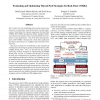Free Online Productivity Tools
i2Speak
i2Symbol
i2OCR
iTex2Img
iWeb2Print
iWeb2Shot
i2Type
iPdf2Split
iPdf2Merge
i2Bopomofo
i2Arabic
i2Style
i2Image
i2PDF
iLatex2Rtf
Sci2ools
123
click to vote
LCTRTS
2001
Springer
2001
Springer
Evaluating and Optimizing Thread Pool Strategies for Real-Time CORBA
Strict control over the scheduling and execution of processor resources is essential for many fixed-priority real-time applications. To facilitate this common requirement, the Real-Time CORBA (RT-CORBA) specification defines standard middleware features that support end-to-end predictability for operations in such applications. One of the most important features in RT-CORBA is thread pools, which allow application developers and end-users to configure and control processor resources. This paper provides two contributions to the evaluation of techniques for improving the quality of implementation of RTCORBA thread pools. First, we describe the key patterns underlying common strategies for implementing RT-CORBA thread pools. Second, we evaluate each thread pool strategy in terms of its consequences on (1) feature support, such as request buffering and thread borrowing, (2) scalability in terms of endpoints and event demultiplexers required, (3) efficiency in terms of data movement,...
| Added | 30 Jul 2010 |
| Updated | 30 Jul 2010 |
| Type | Conference |
| Year | 2001 |
| Where | LCTRTS |
| Authors | Irfan Pyarali, Marina Spivak, Ron Cytron, Douglas C. Schmidt |
Comments (0)

